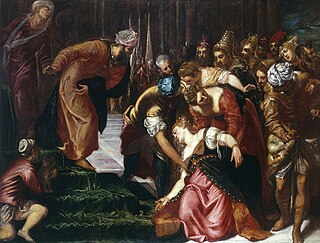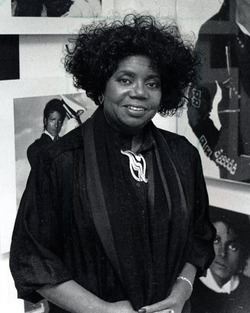
The Book of Esther, also known in Hebrew as "the Scroll", is a book in the third section of the Hebrew Bible. It is one of the Five Scrolls in the Hebrew Bible and later became part of the Christian Old Testament. The book relates the story of a Jewish woman in Persia, born as Hadassah but known as Esther, who becomes queen of Persia and thwarts a genocide of her people.

Esther, originally Hadassah, is the eponymous heroine of the Book of Esther in the Hebrew Bible. According to the biblical narrative, which is set in the Achaemenid Empire, the Persian king Ahasuerus falls in love with Esther and marries her. His grand vizier Haman is offended by Esther's cousin and guardian Mordecai because of his refusal to bow before him; bowing in front of another person was a prominent gesture of respect in Persian society, but deemed unacceptable by Mordecai, who believes that a Jew should only express submissiveness to God. Consequently, Haman plots to have all of Persia's Jews killed, and eventually convinces Ahasuerus to permit him to do so. However, Esther foils the plan by revealing and decrying Haman's plans to Ahasuerus, who then has Haman executed and grants permission to the Jews to take up arms against their enemies; Esther is hailed for her courage and for working to save the Jewish nation from eradication.

Ahasuerus is a name applied in the Hebrew Bible to three rulers of Ancient Persia and to a Babylonian official first appearing in the Tanakh in the Book of Esther and later in the Book of Tobit. It is a transliteration of either Xerxes I or Artaxerxes I; both are names of multiple Achaemenid dynasty Persian kings.

Mordecai is one of the main personalities in the Book of Esther in the Hebrew Bible. He is described in Tanna Devei Eliyahu as being the son of Jair, of the tribe of Benjamin and member of the Sanhedrin. Mordecai was also the cousin and guardian of Esther, who became queen of Persia under the reign of Ahasuerus. Mordecai's loyalty and bravery are highlighted in the story as he helps Esther foil the plot of Haman, the king's Vizier, to exterminate the Jewish people. His story is celebrated in the Jewish holiday of Purim, which commemorates his victory. However, since the 1890s, some academics have suggested that Purim originated from a Babylonian or Persian myth or festival, noting the lack of overt religious elements in the story, with a hypothesis that “The Book of Esther is a historicized myth or ritual”.

Purim is a Jewish holiday that commemorates the saving of the Jewish people from annihilation at the hands of an official of the Achaemenid Empire named Haman, as it is recounted in the Book of Esther.

The Bell Jar is the only novel written by the American writer and poet Sylvia Plath. Originally published under the pseudonym "Victoria Lucas" in 1963, the novel is supposedly semi-autobiographical with the names of places and people changed. The book is often regarded as a roman à clef because the protagonist's descent into mental illness parallels Plath's experiences with what may have been clinical depression or bipolar II disorder. Plath died by suicide a month after its first United Kingdom publication.

Esther Hart is a Dutch singer.

Esther Elizabeth Rolle was an American actress. She is best known for her role as Florida Evans, on the CBS television sitcom Maude, for two seasons (1972–1974), and its spin-off series Good Times, for which she was nominated for a Golden Globe Award for Best Actress - Television Series Musical or Comedy in 1976. In 1979, Rolle won the Emmy Award for Outstanding Supporting Actress in a Limited Series or Special for the television film Summer of My German Soldier.

Bleak House is a novel by Charles Dickens, first published as a 20-episode serial between 12 March 1852 and 12 September 1853. The novel has many characters and several subplots, and is told partly by the novel's heroine, Esther Summerson, and partly by an omniscient narrator. At the centre of Bleak House is a long-running legal case in the Court of Chancery, Jarndyce and Jarndyce, which comes about because a testator has written several conflicting wills. In a preface to the 1853 first edition, Dickens said there were many actual precedents for his fictional case. One such was probably Thellusson v Woodford, in which a will read in 1797 was contested and not determined until 1859. Though many in the legal profession criticised Dickens's satire as exaggerated, Bleak House helped support a judicial reform movement that culminated in the enactment of legal reform in the 1870s.

Esther Jane Williams was an American competitive swimmer and actress. She set regional and national records in her late teens on the Los Angeles Athletic Club swim team. Unable to compete in the 1940 Summer Olympics because of the outbreak of World War II, she joined Billy Rose's Aquacade, where she took on the role vacated by Eleanor Holm after the show's move from New York City to San Francisco. While in the city, she spent five months swimming alongside Olympic gold-medal winner and Tarzan star Johnny Weissmuller. Williams caught the attention of Metro-Goldwyn-Mayer scouts at the Aquacade. After appearing in several small roles, and alongside Mickey Rooney in an Andy Hardy film and future five-time co-star Van Johnson in A Guy Named Joe, Williams made a series of films in the 1940s and early 1950s known as "aquamusicals", which featured elaborate performances with synchronised swimming and diving.

Esther Louise McVey, Lady Davies, is a British Conservative Party politician and television presenter who has been serving as the Member of Parliament (MP) for Tatton since 2017, and served as the MP for Wirral West from 2010 to 2015. She previously served in cabinet as Minister of State for Employment from 2013 to 2015, Secretary of State for Work and Pensions in 2018, Minister of State for Housing and Planning from 2019 to 2020 and Minister of State without Portfolio from 2023 to 2024.

Old Ironsides is a 1926 American silent historical war film directed by James Cruze and starring Charles Farrell, Esther Ralston, Wallace Beery, George Bancroft and Boris Karloff in a small role. It was produced and distributed by Paramount Pictures.

Esther Mountain is a mountain located in Essex County, New York. The mountain is the northernmost of the High Peaks of the Adirondack Mountains and its 28th highest peak. It was the only High Peak named for a woman until 2014, having been named in honor of Esther McComb, who made the first recorded climb to the summit in 1839, at age 15; at the time she was attempting to climb Whiteface Mountain from the north.
Little Miss Smiles is a 1922 American drama film directed by John Ford. The film is considered to be lost.

Esther Gordy Edwards was a staff member and associate of her younger brother Berry Gordy's Motown label during the 1960s. Edwards created the Motown Museum, Hitsville U.S.A., by preserving the label's Detroit studio. She also served as president of the Motown Museum and has been called the "Mother of Motown". Edwards was posthumously inducted into the Michigan Women's Hall of Fame in 2022.

Esther Cremer is a German athlete who specialises in the 400 metres.
Esther Park, also spelt Estherpark, is a suburb of Kempton Park, in Gauteng province, South Africa. It is west of the city centre.

Esther McCready was a nurse and teacher who desegregated the University of Maryland School of Nursing in 1950. The case was filed in 1949 in Baltimore City Court by National Association for the Advancement of Colored People lawyers Charles Hamilton Houston and Donald Gaines Murray. After the court sided with the university, the case went to the Maryland Court of Appeals, where it was argued by Houston, Murray, and Thurgood Marshall. The lower court's ruling was overturned by the Maryland Court of Appeals, and McCready began classes on September 5, 1950. She is in the Maryland Women's Hall of Fame.
Esther is a 1916 British silent historical film directed by Maurice Elvey and starring Elisabeth Risdon, Fred Groves and Charles Rock. The film portrays the biblical story of Esther.

Orphan: First Kill is a 2022 American psychological horror film directed by William Brent Bell, written by David Coggeshall, based on a story by David Leslie Johnson-McGoldrick and Alex Mace. It is a prequel to the 2009 film Orphan. It stars Isabelle Fuhrman, Julia Stiles, Rossif Sutherland, Hiro Kanagawa, and Matthew Finlan.
















